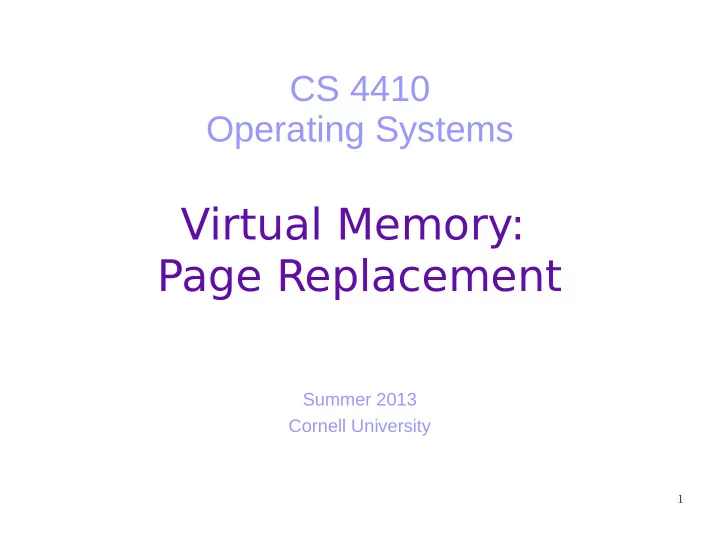

CS 4410 Operating Systems Virtual Memory: Page Replacement Summer 2013 Cornell University 1
Today ● Is there any replacement algorithm that approximates OPT? ● LRU ● Other algorithms ● Thrashing ● Working Set ● Page Fault Frequency 2
LRU Page Replacement ● Replace the page that has not been used for the longest period of time. ● Use the recent past as an approximation of the near future. Reference string: 1, 2, 3, 4, 1, 2, 5, 1, 2, 3, 4, 5 1 1 1 5 1 2 2 2 2 2 5 3 4 4 5 3 4 3 3 4 3
LRU Implementation ● Counters ● Each page-table entry is associated with a time-of- use field. ● CPU updates the field of a referenced page. ● Scan the page table to find the LRU page. ● Stack ● Whenever a page is referenced, it is removed from the stack and put on the top. ● The LRU page is always at the bottom. ● The update is expensive. 4
LRU: Clock Algorithm ● Each page has a reference bit. Set on use, reset periodically by the OS. ● ● Algorithm: FIFO + reference bit (keep pages in circular list) ● Scan: if ref bit is 1, set to 0, and proceed. If ref bit is 0, stop and evict. ● ● Problem: R=1 R=1 Low accuracy for large memory ● R=0 R=0 R=1 R=0 R=1 R=1 R=1 R=0 R=0 5
LRU: Clock Algorithm ● Solution: Add another hand Leading edge clears ref bits ● Trailing edge evicts pages with ref bit 0 ● ● What if angle small? R=1 ● What if angle big? R=1 R=0 R=0 R=1 R=0 R=1 R=1 R=1 R=0 R=0 6
Other Algorithms MRU: Remove the most recently touched page. ● Works well for data accessed only once, e.g. a movie file. ● Not a good fit for most other data, e.g. frequently accessed items. ● LFU: Remove page with lowest count. ● No track of when the page was referenced. ● Use multiple bits. Shift right by 1 at regular intervals. ● MFU: remove the most frequently used page ● 7
Global vs Local Allocation ● Global replacement Single memory pool for entire system. ● On page fault, evict oldest page in the system. ● Problem: lack of performance isolation. ● ● Local (per-process) replacement Have a separate pool of pages for each process. ● Page fault in one process can only replace pages from its own process. ● Problem: might have idle resources. ● 8
Thrashing ● Def: Excessive rate of paging May stem from lack of resources. ● More likely, caused by bad choices of the eviction algorithm. ● Keep throwing out page that will be referenced soon. ● So, they keep accessing memory that is not there. ● ● Why does it occur? Poor locality, past != future ● There is reuse, but process does not fit model. ● Too many processes in the system ● ● How can we solve this problem? 9
Working Set Estimate locality → Identify useful pages → Do not evict these pages. ● Working Set = An approximation of the program's locality . ● The set of pages in the most recent Δ page references. ● Example (Δ = 10): ● t1 → WSS = {1,2,5,6,7} ● t2 → WSS = {3,4} ● 10
Working Set ● How large the Δ should be? ● Total demand for frames: ● D = Σ WSSi ● If D > available memory frames: – Thrashing – The OS selects a process to suspend. ● Target: ● No thrashing ● High multiprogramming 11
Working Set Approximation ● Approximate with interval timer + a reference bit. ● Example: Δ = 10,000 Timer interrupts after every 5000 time units. ● Keep in memory 2 bits for each page. ● Whenever a timer interrupts copy and set the values of all reference bits ● to 0. If one of the bits in memory = 1 → page in working set ● ● Why is this not completely accurate? Cannot tell (within interval of 5000) where reference occurred. ● ● Improvement = 10 bits and interrupt every 1000 time units. 12
Page Fault Frequency Thrashing viewed as poor ratio of fetching to work. ● PFF = page faults / instructions executed. ● If PFF rises above threshold, process needs more memory. ● Not enough memory on the system? → Swap out. ● If PFF sinks below threshold, memory can be taken away. ● 13
Working Sets and Page Fault Rates Working set Page fault rate transition stable 14
Today ● Is there any replacement algorithm that approximates OPT? ● LRU ● Other algorithms ● Thrashing ● Working Set ● Page Fault Frequency 15
Recommend
More recommend